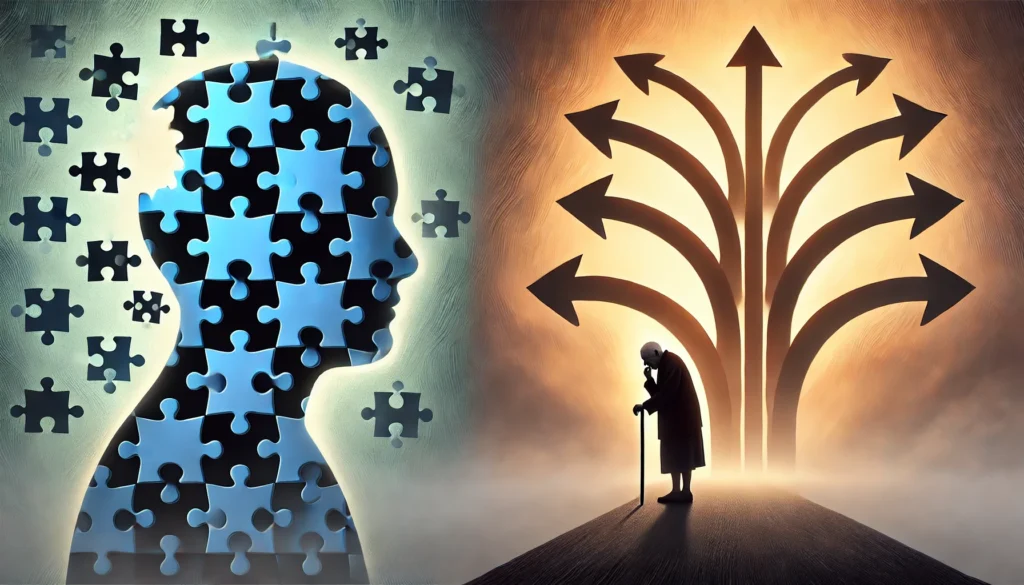When you hear the terms “amnesia” and “dementia,” it’s easy to conflate the two, as both involve memory impairment. However, they are distinct conditions with different causes, symptoms, and implications. In this article, we’ll delve into the nuances of amnesia versus dementia, exploring their definitions, symptoms, and the latest research on these intriguing topics.
You may also like: Tips to Improve Low Average Memory Performance
What is Amnesia?
Amnesia is primarily a memory disorder characterized by an inability to recall past experiences or learn new information. It is often the result of brain damage, disease, or psychological trauma. Amnesia can manifest in several forms, each with unique characteristics.
Types of Amnesia
Amnesia is not a one-size-fits-all condition; it presents in various forms, each with distinct features and implications.
- Anterograde Amnesia: This type of amnesia involves the inability to form new memories after the onset of the disorder. While long-term memories from before the event remain intact, new information fails to consolidate into long-term memory. Individuals often find themselves living in a perpetual present, unable to remember recent events or experiences.
- Retrograde Amnesia: Individuals with retrograde amnesia experience difficulty recalling information or events that occurred before the onset of amnesia. It’s as if a temporal line has been drawn, separating past memories from the present. The extent of memory loss can vary, ranging from a few hours to several years, depending on the severity of the condition.
- Transient Global Amnesia: A temporary episode of memory loss that is not attributed to neurological conditions like epilepsy or stroke. It usually resolves within 24 hours and is not typically a recurring issue. The sudden onset can be alarming, but recovery is generally complete without lasting effects.
Causes of Amnesia
Understanding the root causes of amnesia is essential for diagnosis and treatment.
- Brain Injury: Traumatic brain injury, often resulting from accidents or falls, can lead to amnesia. The extent of memory loss depends on the severity and location of the injury. The hippocampus, a critical area for memory formation, is particularly vulnerable.
- Psychological Trauma: In some cases, amnesia may arise from severe emotional shock or trauma. This form of amnesia, often termed dissociative amnesia, serves as a psychological defense mechanism, blocking out memories of distressing events.
- Neurological Disorders: Conditions such as Alzheimer’s disease or encephalitis can cause amnesia. The gradual deterioration of brain function in these disorders impairs memory formation and recall, often accompanied by other cognitive deficits.
Amnesia Symptoms
The symptoms of amnesia can vary depending on the type and severity. Common symptoms include:
- Difficulty Recalling Past Events (Retrograde Amnesia): Individuals may struggle to remember significant life events, personal experiences, or learned skills. This can lead to confusion and a sense of loss.
- Inability to Form New Memories (Anterograde Amnesia): This symptom is often the most debilitating, affecting daily functioning and relationships. Individuals may repeatedly ask the same questions or forget recent conversations.
- Confusion or Disorientation: Amnesia can cause general disorientation, making it challenging for individuals to keep track of time and place. This can lead to anxiety and frustration.
- False Memory Creation (Confabulation): Some individuals may unintentionally fabricate memories to fill gaps in their recollection. This is not an intentional act of deception but a cognitive attempt to make sense of fragmented memories.

What is Dementia?
Dementia, on the other hand, is an umbrella term used to describe a range of symptoms associated with a decline in cognitive function severe enough to interfere with daily life. It is not a specific disease but a syndrome that can result from various underlying conditions.
Types of Dementia
Dementia encompasses several subtypes, each with distinct pathologies and clinical manifestations.
- Alzheimer’s Disease: The most common form of dementia, characterized by plaques and tangles in the brain leading to memory loss and cognitive decline. The progression is gradual, often starting with mild memory issues and advancing to severe cognitive impairment.
- Vascular Dementia: Caused by reduced blood flow to the brain, often following a stroke or series of mini-strokes. Symptoms can vary widely but often include problems with planning, reasoning, and judgment.
- Lewy Body Dementia: Involves abnormal protein deposits in the brain, leading to symptoms similar to both Alzheimer’s and Parkinson’s disease. Patients may experience visual hallucinations, movement disorders, and cognitive fluctuations.
- Frontotemporal Dementia: Results from damage to the frontal and temporal lobes of the brain, affecting personality, behavior, and language. Unlike other dementias, memory is not typically affected in the early stages.
Dementia Symptoms
Dementia manifests through a wide array of symptoms, reflecting its impact on multiple cognitive domains.
- Memory Loss: This is often the earliest and most noticeable symptom, impacting short-term memory and the ability to learn new information. Over time, long-term memory is also affected.
- Cognitive Decline: Dementia affects various cognitive functions, including attention, language, and executive functions. This leads to difficulties in communication, problem-solving, and complex task execution.
- Behavioral Changes: Personality changes, apathy, and depression are common. Individuals may exhibit mood swings, social withdrawal, and a loss of interest in previously enjoyed activities.
- Disorientation: People with dementia often experience confusion regarding time, place, and identity. This can result in wandering and an increased risk of getting lost.
Amnesia and Dementia: Key Differences
While both amnesia and dementia involve memory issues, they differ significantly in their scope and impact.
- Scope: Amnesia is primarily limited to memory impairment, whereas dementia affects memory, thinking, language, and problem-solving abilities. The multifaceted nature of dementia results in a broader range of symptoms and challenges.
- Progression: Amnesia can be sudden and temporary or long-term, but it doesn’t necessarily worsen over time. Dementia, however, is progressive, meaning symptoms gradually worsen. Understanding this progression is crucial for planning care and support.
- Causes: Amnesia is typically caused by brain injury, illness, or psychological trauma, while dementia is often due to neurodegenerative diseases or vascular issues. Each condition requires different diagnostic approaches and treatment strategies.
Current Trends in Research
The study of memory disorders, including amnesia and dementia, is a rapidly evolving field. Researchers are continually exploring new methods for diagnosis, treatment, and prevention.
Advances in Amnesia Research
Recent studies are delving into the potential of neuroplasticity and memory rehabilitation techniques to help individuals with amnesia recover lost memories or improve their ability to form new ones. Innovative therapies, such as virtual reality and cognitive training, show promise in this area.
- Neuroplasticity and Memory Rehabilitation: Researchers are harnessing the brain’s ability to reorganize itself to compensate for lost functions. By engaging patients in targeted exercises, they aim to strengthen existing neural pathways and foster new connections.
- Technological Interventions: Virtual reality is being explored as a tool for memory rehabilitation. By immersing patients in controlled environments, therapists can simulate real-world scenarios that encourage memory recall and formation.
- Pharmacological Approaches: Although drug treatments for amnesia are still in experimental stages, some medications show potential in enhancing memory retention and neural regeneration. Continued research is needed to validate these findings.
Dementia Research Breakthroughs
Dementia research is focused on early detection and intervention. Biomarkers and advanced imaging techniques are being developed to identify dementia-related changes in the brain before symptoms appear. Additionally, there is significant interest in lifestyle interventions, such as diet, exercise, and cognitive engagement, to reduce the risk of developing dementia.
- Early Detection Techniques: Researchers are identifying biomarkers that signal the onset of dementia before clinical symptoms manifest. Blood tests and imaging technologies are being refined to provide earlier and more accurate diagnoses.
- Lifestyle and Prevention: There’s growing evidence that lifestyle factors, including a balanced diet, regular physical activity, and mental stimulation, can significantly reduce dementia risk. Public health initiatives are promoting these strategies as preventive measures.
- Novel Therapeutics: The development of drugs targeting amyloid plaques and tau tangles holds promise for altering the disease course. Clinical trials are underway to assess the efficacy of these potential treatments in slowing or reversing dementia progression.
Future Implications
Understanding the differences between amnesia and dementia is crucial not only for accurate diagnosis but also for developing targeted therapies and interventions. As research continues to advance, there is hope for improved outcomes for individuals affected by these memory disorders.

Practical Advice for Health and Wellness Coaches
For health and wellness coaches, staying informed about the latest research on amnesia and dementia is vital. Sharing this knowledge with clients can empower them to make informed decisions about their health and well-being. Encouraging cognitive activities, healthy lifestyle choices, and regular medical check-ups can be part of a proactive approach to brain health.
- Staying Informed: Keeping abreast of the latest research findings enables coaches to provide evidence-based guidance. Attending workshops, conferences, and online courses can enhance their understanding and effectiveness.
- Empowering Clients: By educating clients about the distinctions between amnesia and dementia, coaches can help them recognize early signs and seek appropriate medical advice. Knowledge empowers individuals to take control of their cognitive health.
- Promoting Lifestyle Changes: Coaches can encourage clients to adopt brain-friendly habits, such as engaging in challenging cognitive activities, maintaining a balanced diet rich in antioxidants, and staying physically active. These practices contribute to overall brain health and resilience.

Conclusion
Amnesia and dementia, while related to memory impairment, differ significantly in their causes, symptoms, and implications. By understanding these differences, health professionals, science journalists, and biohackers alike can better navigate the complex landscape of memory disorders. As research progresses, the potential for improved diagnostic tools and treatments offers hope for those affected by these challenging conditions.
In a world where memory is central to our identity, staying informed and proactive about brain health is more important than ever. Whether you’re a health coach guiding clients or a biohacker seeking to optimize mental acuity, understanding amnesia and dementia is a crucial step in the journey toward cognitive wellness. With ongoing research and innovation, the future holds promise for enhanced quality of life and cognitive health for all individuals.
Further Reading:
The differences between normal aging and dementia
Memory loss: When to seek help
Amnesia Vs. Dementia: Know The Difference
Important Note: The information contained in this article is for general informational purposes only, and should not be construed as health or medical advice, nor is it intended to diagnose, prevent, treat, or cure any disease or health condition. Before embarking on any diet, fitness regimen, or program of nutritional supplementation, it is advisable to consult your healthcare professional in order to determine its safety and probable efficacy in terms of your individual state of health.
Regarding Nutritional Supplements Or Other Non-Prescription Health Products: If any nutritional supplements or other non-prescription health products are mentioned in the foregoing article, any claims or statements made about them have not been evaluated by the U.S. Food and Drug Administration, and such nutritional supplements or other health products are not intended to diagnose, treat, cure, or prevent any disease.


